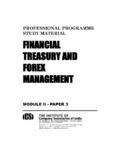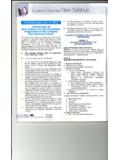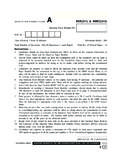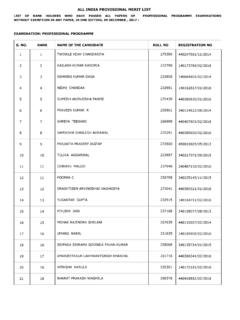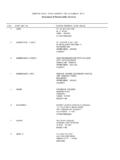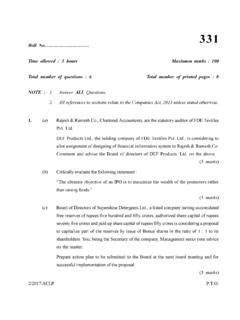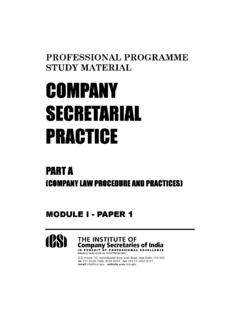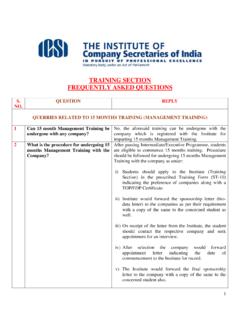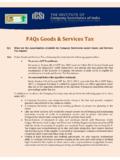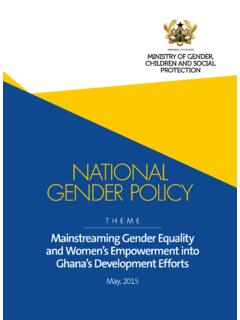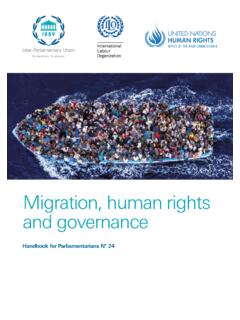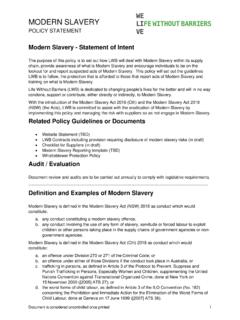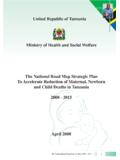Transcription of INDUSTRIAL, LABOUR AND GENERAL LAWS
1 ISTUDY MATERIALEXECUTIVE PROGRAMMEINDUSTRIAL, LABOURANDGENERAL LAWSMODULE IIPAPER 7 ICSI House, 22, Institutional Area, Lodi Road, New Delhi 110 003tel 011-4534 1000, 4150 4444fax +91-11-2462 6727email THE INSTITUTE OF COMPANY SECRETARIES OF INDIATIMING OF HEADQUARTERSM onday to FridayOffice Timings to Dealing TimingsWithout financial transactions to financial transactions to , Typesetting by AArushi Graphics, Prashant Vihar, New Delhi, andPrinted at M P Printers/10000/July 2014iiiiiEXECUTIVE PROGRAMMEINDUSTRIAL, LABOUR AND GENERAL LAWSThe LABOUR laws derive their origin, authority and strength from the provisions of the Constitution of India. Therelevance of the dignity of human LABOUR and the need for protecting and safeguarding the interest of LABOUR ashuman beings has been enshrined in Chapter-III (Articles 16, 19, 23 & 24) and Chapter IV (Articles 39, 41, 42,43, 43A & 54) of the Constitution of India keeping in line with Fundamental Rights and Directive Principles ofState Policy.
2 LABOUR law reforms are an ongoing and continuous process and the Government has been introducingnew laws and amending the existing ones in response to the emerging needs of the workers in a constantlydynamic economic environment. The Employees Compensation Act, 1923 (earlier called the Workmen sCompensation Act, 1923) was amended The Payment of Gratuity Act, 1972 was amendedthrough notification dated to cover teachers in educational institutions and enhancethe ceiling on gratuity from lakh to lakh The subject of GENERAL Laws is inherentlycomplicated and is subjected to constant refinement through new primary legislations, rules and regulationsmade thereunder and court decisions on specific legal the light of above developments, this study material has been prepared to provide an understanding of certainindustrial, LABOUR and GENERAL legislations which have direct bearing on the functioning of companies.
3 The studymaterial has been divided into two parts consisting of twenty five study lessons. Part A consists of Study Lessons1 to 19, whereas Part B consists of Study Lessons 20 to study material has been published to aid the students in preparing for the industrial, LABOUR and generallaws paper of the CS Executive Programme. It is part of the education kit and takes the students step by stepthrough each phase of preparation stressing key concepts, pointers and procedures. Company Secretaryshipbeing a professional course, the examination standards are set very high, with emphasis on knowledge ofconcepts, applications, procedures and case laws, for which sole reliance on the contents of this study materialmay not be enough. Besides, as per the Company Secretaries Regulations, 1982, students are expected to beconversant with the amendments to the laws made upto six months preceding the date of examination.
4 Thematerial may, therefore, be regarded as the basic material and must be read alongwith the original Bare Acts,Rules, Regulations, Case Law, as well as recommended readings given with each study the area of industrial, LABOUR and GENERAL laws undergoes frequent changes, it becomes necessary for everystudent to constantly update himself with the various legislative changes made as well as judicial pronouncementsrendered from time to time by referring to the Institute s journal Chartered Secretary as well as other law/professional legislative changes made upto July 2014 have been incorporated in the study material. However, it may sohappen that some developments might have taken place during the printing of the study material and its supplyto the students. The students are therefore, advised to refer to the e-bulletin and other publications for updationof the study the event of any doubt, students may write to the Directorate of Academics and Professional Development inthe Institute for clarification at Although due care has been taken in publishing this studymaterial yet the possibility of errors, omissions and/or discrepancies cannot be ruled out.
5 This publication isreleased with an understanding that the Institute shall not be responsible for any errors, omissions and/ordiscrepancies or any action taken in that there be any discrepancy, error or omission noted in the study material, the Institute shall be obliged ifthe same are brought to its notice for issue of corrigendum in the e-bulletin .ivThe Institute has decided that the examination for this paper under new syllabus will be held from December2014 session in the Optical Mark Recognition (OMR) format, whereby students are required to answer multiplechoice questions on OMR sheet by darkening the appropriate choice by HB pencil. One mark will be awardedfor each correct answer. There is NO NEGATIVE mark for incorrect specimen OMR sheet is appended at the end of the study material. There is practice test paper in the study toacquaint students with the pattern of examination.
6 These are for practice purpose only, not to be sent to 7: INDUSTRIAL, LABOUR AND GENERAL LAWS (100 Marks)Level of Knowledge:WorkingKnowledgeObjective:To acquire knowledge and understanding of Industrial, LABOUR and GENERAL :Part A: Industrial and LABOUR Laws (70 Marks) Act, 1948 Object and Scope Application and Major Provisions Wages Act, 1948 Object and Scope Application and Major Provision of Minimum Wages of Wages Act, 1936 Object and Scope Application and Major Provisions Remuneration Act, 1976 Object and Scope Application and Major Provisions State Insurance Act, 1948 Object and Scope Application and Major Provisions Provident Funds and Miscellaneous Provisions Act, 1952 Object and Scope Application and Major Provisions of Bonus Act, 1965 Object and Scope Application and Major Provisions ofPayment of Bonus of Gratuity Act, 1972 Object and Scope Application and Major Provisions ofPayment of Gratuity s Compensation Act, 1923 Object and Scope Application and Major Provisions LABOUR (Regulation and Abolition)
7 Act, 1970 Object and Scope Application and Major Provisions Benefit Act,1961 Object and Scope Application and Major Provisions child LABOUR (Prohibition and Regulation) Act, 1986 Object and Scope Application and Major Provisions Employment (Standing Orders) Act, 1946 Object and Scope Application and Major Provisions Disputes Act, 1947 Object and Scope Application and Major Provisions Trade Union Act, 1926 Object and Scope Application and Major Provisions LABOUR Laws (Exemption from Furnishing Returns and Maintaining Register by CertainEstablishments) Act, 1988 Object and Scope Application and Major Provisions Exchanges (Compulsory Notification of Vacancies) Act, 1959 Object and Scope Application and Major Provisions Act, 1961 Object and Scope Application and Major Provisions Audit covering the above Acts and those Industry Specific ActsPart B: GENERAL Laws (30 Marks) of India Broad Framework of the Constitution of India.
8 Fundamental Rights, Directive Principles of State Policy Ordinance Making Powers of the President and the Governors Legislative Powers of the Union and the Statesvii Freedom of Trade, Commerce and Intercourse Constitutional Provisions relating to State Monopoly Judiciary, Writ Jurisdiction of High Courts and the Supreme Court Different Types of Writs -Habeas Corpus, Mandamus, Prohibition, Quo Warranto and Certiorari Concept ofDelegated of Statutes Need for Interpretation of a Statute GENERAL Principles of Interpretation Internal and External Aids to Interpretation Primary and Other Overview of Law relating to Specific Relief; Limitation and of Civil Procedure Elementary Knowledge of the Structure of Civil Courts, their Jurisdiction Basic Understanding of Certain Terms - Order, Judgment and Decree, Stay Of Suits,Res Judicata Suits by Companies, Minors Basic Understanding of Summary Proceedings, Appeals, Reference, Review and Penal Code and Criminal Procedure Code Important Definitions and Salient Features,Mens Rea Cognizable and Non-Cognizable Offences, Bail, Continuing Offences, Searches, Limitation for taking Cognizance of Certain to Information Salient Features of the Right to Information (RTI) Act, 2005 Objective Public Authorities & their Obligations Designation of Public Information Officers (PIO) and their Duties Request for Obtaining Information Exemption from Disclosure Who is excluded Information Commissions (Central & State)
9 And their Powers Appellate Authorities Penalties Jurisdiction of Courts Role of Central/State GovernmentsviiiLIST OF RECOMMENDED BOOKSPAPER 7 : INDUSTRIAL, LABOUR AND GENERAL Malik:Industrial Law; Eastern Book Company; 34, Lalbagh, Kapoor:Handbook of Industrial Law; Sultan Chand & Sons, 23, Darya Ganj, NewDelhi Gulshan &:Economic, LABOUR and Industrial Laws; Sultan Chand & Sons, 23, KapoorDaryaganj, New Delhi- L. Malik: LABOUR and Industrial Laws (Pocket Edition); Eastern Book Company,34, Lalbagh, Lucknow-226 Kumar: LABOUR Laws; Universal Laws Publishing Co. Pvt. Ltd., Karnal Road,Delhi & Industrial:Universal Law Publishing Co. Pvt. Ltd., Karnal Road, Delhi (Legal Manual) Bare Kapoor & Rajni Abbi: GENERAL Laws and Procedures; Sultan Chand & Sons. New Das Basu:Constitution of India; Prentice Hall of India, New s: GENERAL and Commercial Satalvad:Mulla on the Transfer of Property Act, 1882; Tripathi Private Ltd.
10 , Tandon:Civil Procedure Code; Allahabad Law Agency, Banerjee:The Law of Specific Relief; Law Book Company, Iyer:The Law of Torts; Tripathi, Private Ltd., Singh (Ed.) Shukla s the Constitution of India; Eastern Book Company, Sarathi:Elements of Law of Evidence, Eastern Book Company, Ramachandran:Law of Limitation; Eastern Book Company, Singh:Principles of Statutory Interpretation; Wadhwa Publishing Company, Book Company:Code of Criminal Kelkar:Lectures on Criminal Procedure, 4th Edn., Revised by Dr. Pillai, Eastern Book Company, :Interpretation of Statutes; Eastern Book Company, 34, Lalbagh, Lucknow-226 :Available on ICSI website - Secretary:The ICSI, New Delhi-110 003.(Monthly) India Reporter:All India Reporter Ltd., Congress Nagar, OF STUDY LESSONSPART Act, Wages Act, of Wages Act, Remuneration Act, State Insurance Act, Provident Funds and Miscellaneous Provisions Act, of Bonus Act, of Gratuity Act, s Compensation Act, LABOUR (Regulation and Abolition) Act, Benefit Act, child LABOUR (Prohibition and Regulation) Act, Employment (Standing Orders) Act, Disputes Act, Trade Union Act, LABOUR Laws (Exemption from Furnishing Returns and Maintaining Register by CertainEstablishments) Act, Exchanges(Compulsory Notification of Vacancies) Act, Act, under LABOUR LegislationsPART of of Overview of Law relating to Specific Relief.
